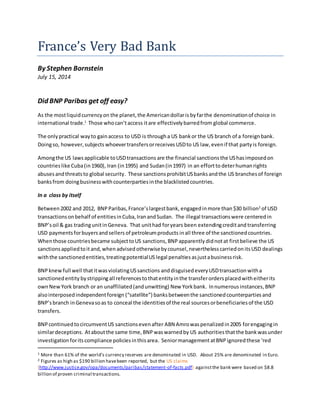France's very bad bank (1)
- 1. FranceŌĆÖs Very Bad Bank By Stephen Bornstein July 15, 2014 Did BNP Paribas get off easy? As the mostliquidcurrencyon the planet,the Americandollaris byfarthe denominationof choice in international trade.1 Those whocanŌĆÖtaccess itare effectivelybarredfrom global commerce. The onlypractical wayto gainaccess to USD is througha US bankor the US branch of a foreignbank. Doingso, however,subjects whoevertransfersorreceives USDto US law,evenif that party is foreign. Amongthe US lawsapplicable toUSDtransactions are the financial sanctionsthe UShasimposedon countries like Cuba(in1960), Iran (in1995) and Sudan(in1997) in an effortto deterhumanrights abusesandthreatsto global security. These sanctionsprohibitUSbanksandthe US branchesof foreign banksfrom doingbusinesswithcounterpartiesinthe blacklistedcountries. In a class by itself Between2002 and 2012, BNP Paribas,FranceŌĆÖslargestbank, engagedinmore than $30 billion2 of USD transactionsonbehalf of entitiesinCuba,IranandSudan. The illegal transactionswere centeredin BNPŌĆÖsoil & gas tradingunitinGeneva. That unithad foryears been extendingcreditand transferring USD paymentsforbuyersandsellers of petroleumproducts inall three of the sanctionedcountries. Whenthose countriesbecame subjecttoUS sanctions, BNP apparently didnotat firstbelieve the US sanctions appliedtoitand,when advised otherwisebycounsel, nevertheless carriedon itsUSD dealings withthe sanctionedentities,treatingpotentialUS legal penalties asjustabusinessrisk. BNPknew full well thatitwasviolatingUSsanctions anddisguisedevery USDtransaction witha sanctionedentity bystrippingall referencesto thatentityinthe transferordersplacedwitheitherits ownNewYork branch or an unaffiliated(andunwitting) New Yorkbank. Innumerous instances, BNP alsointerposedindependentforeign (ŌĆ£satelliteŌĆØ) banksbetweenthe sanctionedcounterpartiesand BNPŌĆÖsbranch inGenevasoas to conceal the identitiesof the real sourcesorbeneficiariesof the USD transfers. BNPcontinuedtocircumventUS sanctionsevenafter ABN Amrowas penalized in2005 forengagingin similardeceptions. Ataboutthe same time,BNPwaswarnedby US authoritiesthatthe bank wasunder investigation foritscompliance policiesinthisarea. Seniormanagement atBNPignoredthese ŌĆśred 1 More than 61% of the worldŌĆÖs currency reserves are denominated in USD. About 25% are denominated in Euro. 2 Figures as high as $190 billion havebeen reported, but the US claims (http://www.justice.gov/opa/documents/paribas/statement-of-facts.pdf) againstthe bank were based on $8.8 billion of proven criminal transactions.
- 2. flagsŌĆÖas well as multipleinternal warningstostopdealingwith countriessubjecttoUS sanctions. To boot,the bank wasalso lessthanfullycooperative duringthe USinvestigation and, bydraggingitsfeet, prevented USlawenforcementfrombringingcriminal chargesagainst individual BNP employeesand cooperatingsatellite banksdue to afive-yearstatute of limitations. An international incident For the enormityandpersistenceof itsviolations,BNPwasfinedawhopping$8.97 billion3 byUS regulatorsand,more painfully,forcedtopleadguiltytocriminal charges. Itisthe firstforeignbankever to have beencriminallyconvicted forsanctionsviolations. UnderitssettlementwithUSauthorities,the bankalso prematurelyretired64year-oldCOOGeorgesChodronde Courcel forcondoningthe violations,demotedanumberof otherparticipatingemployeesandagreedtosuspenditsso-called ŌĆśdollar-clearingŌĆÖactivitiesinoil &gasfor one year,startingin2015.4 As soonas he got windof the penaltiesfacingBNP,FrenchpresidentFran├¦oisHollandepersonallycalled Barack Obama and toldhimthat singlingoutBNPfora criminal convictionandanexorbitantfine5 was an offense againstFrance since the bankdidnotviolate anyFrenchlaws.6 Obama ignoredHollandeŌĆÖs plea7 and,surprisinglytomany,none of the penaltiesimposeduponBNP turnedoutto really threatenitsbusinessorprospects. Shortlyafteritssettlementwas reached, CEO Jean-LaurentBonnaf├® announcedpubliclythat BNPŌĆÖsclientswouldstickbythe bankand the penalties wouldhave ŌĆ£nomajor impacton the business.ŌĆØ The bankthendeclared itsregularannual dividendand itsstock wasup 3.6% onthe news. Giventhe size anddurationof its illegal transactions,itsfalsificationof recordsand,mostdamning,the intransigence of itsseniormanagement, canyouthinkof any financial institutionmore deservingof beingputout of businessthanBNPParibas? Were itnot for HollandeŌĆÖs intervention,BNPŌĆÖsbanking license inthe USmay well have been revoked andsome BNPhigher-upschargedwithcrimes. Inthe currentenvironment (http://aroundwallstreet.com/2014/01/what-makes-a-securities-case-go- criminal/),if BNPwere anAmericanbank, itŌĆÖsafairguessthat buildingsecuritywould soonbe turning out itslightsforthe last time. 3 BNPŌĆÖs net income in 2013 was $6.5 billion. 4 ŌĆśDollar-clearingŌĆÖis thebusiness of effecting payments in USD and BNPŌĆÖs ŌĆśdollar-clearingŌĆÖactivities in oil & gas accountfor less than 1% of BNPŌĆÖs group revenues. 5 The highest earlier finefor sanctions violationsby any bank was $1.9 billion levied againstHSBC in 2012. In 2005, ABN Amro was the firstforeign bank to be fined for sanctions violations and theamount of the fine was $80 million. 6 Russian presidentVladimir Putin even chimed in on FranceŌĆÖs behalf,claimingthatthe BNP finewas a n attempt by the US to blackmail Franceinto renegingon a pending saleof two warships to Russia. 7 Obama reportedly replied that he doesnŌĆÖt justŌĆ£pick up the phone and call theJustice Department. Perhaps that happens elsewhere.ŌĆØ
- 3. TAGS: FRANCE, BANK,BNPPARIBAS,DOLLAR,FINANCIALSANCTIONS,CUBA,IRAN,SUDAN,USD,OIL & GAS,SATELLITE BANKS,GENEVA,ABN AMRO,GEORGES CHODRON DE COURCEL, DOLLAR-CLEARING, FRAN├ćOISHOLLANDE, BARACKOBAMA, JEAN-LAURENTBONNAF├ē,GUILTYPLEA, CRIMINAL CONVICTION,BANKINGLICENSE,HSBC, VLADIMIRPUTIN,CURRENCY RESERVES


